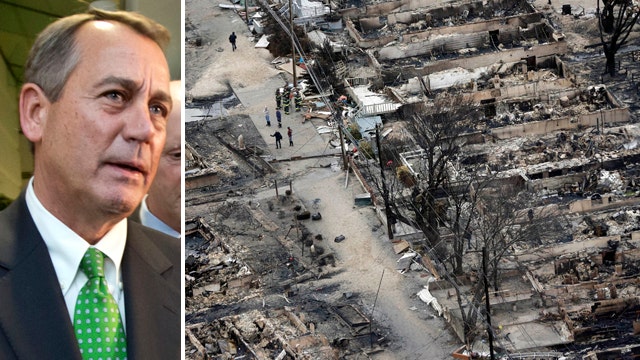House sets vote for superstorm Sandy aid after criticism
Mike Emanuel reports from Capitol Hill
Speaker John Boehner has assured New York and New Jersey lawmakers that the House will vote on a massive aid package for Superstorm Sandy victims by Jan. 15, after facing bipartisan outrage over a decision late Tuesday to postpone the vote until the next session.
Rep. Peter King, R-N.Y., who earlier in the day lambasted party leaders for the move, reported after a closed-door meeting with the speaker that they were told the House would vote Friday on a $9 billion flood insurance measure, followed by a vote on a $51 billion aid bill Jan. 15.
"As far as I'm concerned, I think I can speak for all of the members of the New York and New Jersey delegations, it was an extremely positive meeting," King said.
Boehner and House Republican Leader Eric Cantor affirmed the plan in a written statement, saying: "Getting critical aid to the victims of Hurricane Sandy should be the first priority in the new Congress, and that was reaffirmed today with members of the New York and New Jersey delegations."
While the decision still punts a vote until the next session, which starts Thursday, the meeting appeared to calm tensions in the party. King was among the most vocal in his complaints, earlier calling the decision to put off a vote a "disgrace" and "immoral."
He went so far as to urge constituents to stop donating to congressional Republicans. "I'm saying anyone from New York and New Jersey who contributes one penny to congressional Republicans is out of their minds," King told Fox News. "What they did last night was put a knife in the back of New Yorkers and New Jerseyans."
As President Obama urged the House to vote, New Jersey Gov. Chris Christie and New York Gov. Andrew Cuomo also decried the "failure" to act, saying in a statement: "When American citizens are in need we come to their aid. That tradition was abandoned in the House last night."
At a press conference earlier in the afternoon, Christie said the blame lies with House Republicans and Boehner himself.
"Shame on Congress," Christie said.
But Boehner's toughest Republican critics on the Hill were walking things back late Wednesday.
Rep. Michael Grimm, R-N.Y., who had called the postponement a "betrayal," later said it was "never in question" that Boehner and Cantor wanted to help affected states.
"For whatever reasons the speaker has decided not to bring it to a vote this week. Obviously we disagreed with that but that's in the past," King said.
Some conservatives had earlier expressed concern about the sheer size of the Sandy bill -- the Senate-passed version exceeded $60 billion, at a time when lawmakers were trying to find a way to deal with spending cuts as part of a fiscal-crisis package. That package, though, contained only nominal spending cuts -- while the Sandy aid bill was poised to exceed even those cuts.
Still, the House Appropriations Committee produced a bill Tuesday that significantly pared back the Senate version, bringing it down to $27 billion. The initial plan was to put that bill for a vote, and then allow a separate vote on a $33 billion amendment -- many Republicans were expected to oppose the second half, while potentially approving the $27 billion component.
Now, it appears the House will move forward with a vote on the full $60 billion, in two installments.
A procession of lawmakers took to the House floor Wednesday to urge action on the bill, and decry the decision to postpone it.
"We cannot and we should not wait," House Democratic Whip Steny Hoyer said. "We must not walk away. I urge the speaker of this House to reconsider and act immediately. Now is the time to act."
A spokesman for Boehner, Michael Steel, said, "The speaker is committed to getting this bill passed this month."
The storm was one of the worst ever to hit the Northeast. It was blamed for at least 120 deaths and battered coastline areas from North Carolina to Maine. New York, New Jersey and Connecticut were the hardest hit states. The storm damaged or destroyed more than 72,000 homes and businesses in New Jersey. In New York, 305,000 housing units were damaged or destroyed, and more than 265,000 businesses were affected.
The Associated Press contributed to this report.





